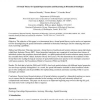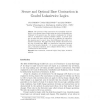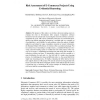68 search results - page 6 / 14 » Relations in Fuzzy Class Theory: : Initial steps |
ARTMED
2006
13 years 7 months ago
2006
Objective: The objective of this paper is to demonstrate how a formal spatial theory can be used as an important tool for disambiguating the spatial information embodied in biomed...
SIAMAM
2008
13 years 7 months ago
2008
Neural fields are an interesting option for modelling macroscopic parts of the cortex involving several populations of neurons, like cortical areas. Two classes of neural field equ...
CCIA
2009
Springer
13 years 8 months ago
2009
Springer
Abstract. The operation of base contraction was successfully characterized for a very general class of logics using the notion of remainder sets. Although, in the general case, thi...
ALDT
2011
Springer
12 years 7 months ago
2011
Springer
Security and sustainability are two critical global challenges that involve the interaction of many intelligent actors. Game theory provides a sound mathematical framework to model...
FSKD
2006
Springer
13 years 11 months ago
2006
Springer
The purpose of this study is to develop a decision making system to evaluate the risks in E-Commerce (EC) projects. Competitive software businesses have the critical task of assess...



